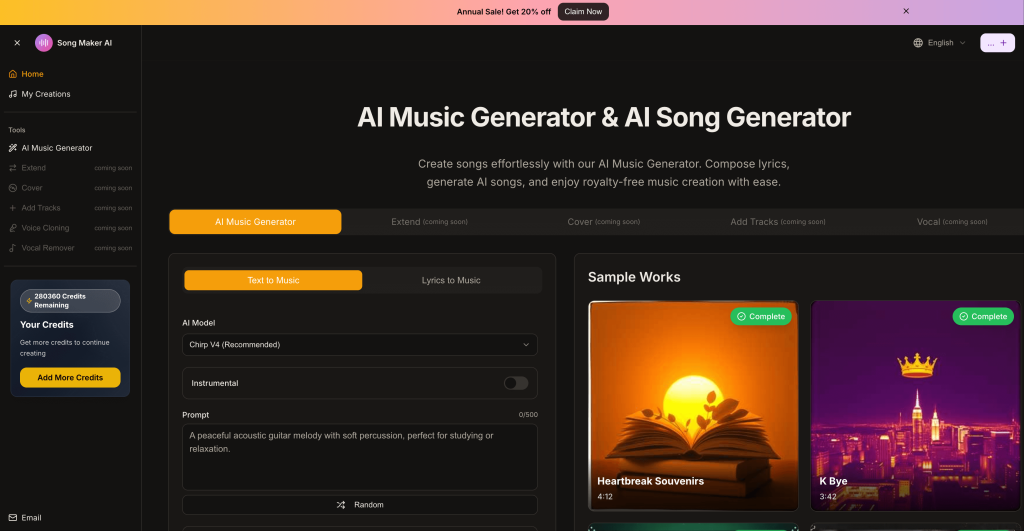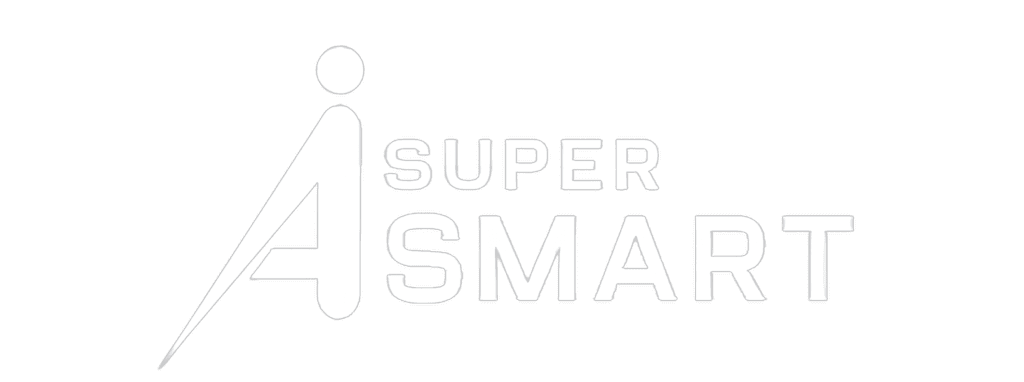AI Music Generator creates professional songs from text and lyrics instantly. Free AI song maker with royalty-free music generation. Transform ideas into original music in seconds. Experience the future of music creation with our AI-powered platform. Listen to amazing tracks created by artificial intelligence, showcasing the endless possibilities of AI in music composition.
Transform your written ideas into complete songs. Simply describe your music—”upbeat electronic dance track” or “emotional piano ballad”—and our AI creates professional songs with vocals and instruments in seconds. No musical experience required. Bring your lyrics to life with AI-powered music. Input your own lyrics or poems, choose a music style, and watch as our AI composer creates a complete song with vocals singing your exact words. Perfect for songwriters, poets, and creative writers.
Key Points :
What is Song Maker AI and Who Is It Really For?
There are a ton of AI music tools popping up, and it’s hard to know which one to use. Some are incredibly complex, while others are basically toys. After using it, I’ve got a clear idea of where Song Maker AI fits.
Related Posts
My Quick Take: It’s a “Song Idea Sketchpad,” Not a Full Studio
Think of Song Maker AI as a fast and easy way to create a musical sketch. You provide the basic building blocks (lyrics and genre), and it builds a simple song around them. It’s incredibly fast, which is its biggest strength.
But it is not a replacement for a Digital Audio Workstation (DAW) like Logic Pro or Ableton Live. You can’t edit individual notes, change the chord progression, or mix the instruments. What it generates is what you get.
The Ideal User vs. Who Should Look Elsewhere
This tool is genuinely useful for a specific type of person.
- It’s great for:
- Content Creators: Need a quick, unique 30-second jingle for your podcast intro or a 1-minute backing track for a YouTube video? This is a perfect use case.
- Lyricists & Hobbyists: If you write lyrics and just want to hear what they might sound like as a song, this is a fun and inspiring tool.
- Educators: Teachers could use this for creative projects with students, turning poetry into music.
- You should probably look elsewhere if you’re a:
- Professional Musician: You will be immediately frustrated by the lack of control and the often generic musical output.
- Producer: You need control over every element of the track, which this tool does not provide.
- Anyone Needing High-Fidelity Audio: The quality is decent for social media, but it won’t stand up on a professional release.
My Step-by-Step Test: Creating a Lo-Fi Track for a YouTube Video
Talk is cheap. I decided to create a short, royalty-free lo-fi track for a video background. Here’s exactly how I did it.
Step 1: The Goal and The Lyrics
My goal was to create a simple, one-minute instrumental with a chill, lo-fi vibe. Since I wanted an instrumental, I wrote simple, thematic lyrics that the AI could use as a guide for the mood.
My Test Lyrics:Rainy Sunday morningCoffee’s getting coldWatching the world go byA story to be told
Step 2: Navigating the Interface and Choosing a Genre
The interface at songmakerai.org is dead simple. You have a few fields to fill out, which I appreciate. No confusing menus.
I pasted in my lyrics, selected the “Lo-fi” genre, and chose a “Chill” mood. For the vocals, I selected “Instrumental” to see if it would create a track without singing.
Step 3: The First Generation – My Initial Reaction
I clicked “Generate,” and in about 45 seconds, it was done.
My first thought was, “Wow, that was fast.” My second thought was, “Okay, that’s surprisingly decent.” It produced a track with a classic lo-fi drum beat, a simple electric piano melody, and some nice atmospheric pads. It completely understood the “rainy Sunday” vibe from the lyrics, even without singing them.
Step 4: Using the “Remix” and “Extend” Features
The first version was only about 40 seconds long. I needed it to be longer, so I hit the “Extend” button. It added another 20 seconds, but the transition was a bit abrupt. It felt like it just tacked on a new section rather than intelligently continuing the song.
Next, I tried the “Remix” button. This is where I learned something important. “Remix” doesn’t change the melody or song structure; it just swaps out the instruments. I clicked it a few times. One version had a saxophone, another had a more prominent bassline. It’s a quick way to get variations on the same core idea.
Step 5: The Final Result and Downloading the Track
After a few “Remix” clicks, I found a version I liked with a smooth electric guitar lead. I extended it one more time to get it just over a minute long.
Downloading is where you encounter the paywall. The free plan lets you generate songs, but to download them in decent quality (and get the commercial license), you need a paid plan.
The Big Questions Answered: Pricing, Quality, and Rights
Here are the practical things you absolutely need to know.
Is Song Maker AI Free? (The Reality of the “Free” Plan)
Yes, there is a free plan, but it’s more like a free trial. You can generate a limited number of songs to see if you like the tool. However, you can’t download your creations without a watermark, and you don’t get a commercial license. To actually use the music, you’ll need to subscribe to a paid plan, which is a fairly standard model.
How Good Is the Audio Quality, Really?
It’s fine for what it is. The quality is comparable to stock music libraries—better than old-school MIDI but not as rich as a professionally produced track. For a YouTube video, a podcast, or a social media post, it’s perfectly usable. I wouldn’t release a song from it on Spotify.
Can I Actually Use This Music on YouTube? (Understanding Commercial Rights)
This is the most important question. According to their site, you get a full commercial license with any of their paid plans. This means you can use the songs you create in monetized YouTube videos, podcasts, and other commercial projects without worrying about copyright strikes. Always double-check their terms of service, as these things can change.
Common Problems & What I Wish I Knew Before Starting
Based on my test and digging through Reddit forums, here are the common frustrations you might face.
- The Vocals Can Sound Very Robotic: While I made an instrumental, I did test the vocal feature. The AI voices are a bit hit-or-miss. They can sound robotic and lack the emotion of a human singer, especially on more complex melodies.
- You Have Almost No Control Over Song Structure: This was my biggest issue. The AI decides where the verse, chorus, and bridge go—if it even creates them at all. You can’t tell it, “Make this part the chorus.”
- The AI Can Ignore or Misinterpret Your Lyrics: If your lyrics are too poetic or don’t follow a simple pattern, the AI can get confused. It might skip lines or generate a melody that doesn’t fit the words at all.
How Does Song Maker AI Compare to Suno or Udio?
You’ve probably heard of other big AI music tools like Suno and Udio. They are a different class of tool.
| Feature | Song Maker AI | Suno / Udio |
| Best For | Quickly turning your specific lyrics into simple songs. | Generating complex music from text prompts. |
| Ease of Use | Very Easy | Moderate Learning Curve |
| Control | Low (Genre, Mood) | High (Detailed style prompts) |
| Vocal Quality | Okay to Robotic | Often Very Realistic |
Think of it this way: With Song Maker AI, you bring the lyrics. With Suno, you bring the idea.
My Final Verdict: Is Song Maker AI Worth It?
So, what’s the bottom line?
Song Maker AI is a genuinely useful tool if you use it for its intended purpose. It’s a fantastic “idea-to-demo” machine. It successfully bridged the gap between my simple lyrics and a finished, usable piece of music in minutes.
If you are a content creator who needs custom, royalty-free background music and is tired of searching through stock libraries, a paid plan is absolutely worth considering. For a hobbyist songwriter, the free version is a fun way to bring your ideas to life.
However, if you’re a serious musician looking for a production partner, you’ll find it too limiting. Use it as a sketchpad to get ideas down, but you’ll need to move to a real DAW to create a professional track.
What has your experience been with AI music tools? Share your favorite (or least favorite) in the comments below


